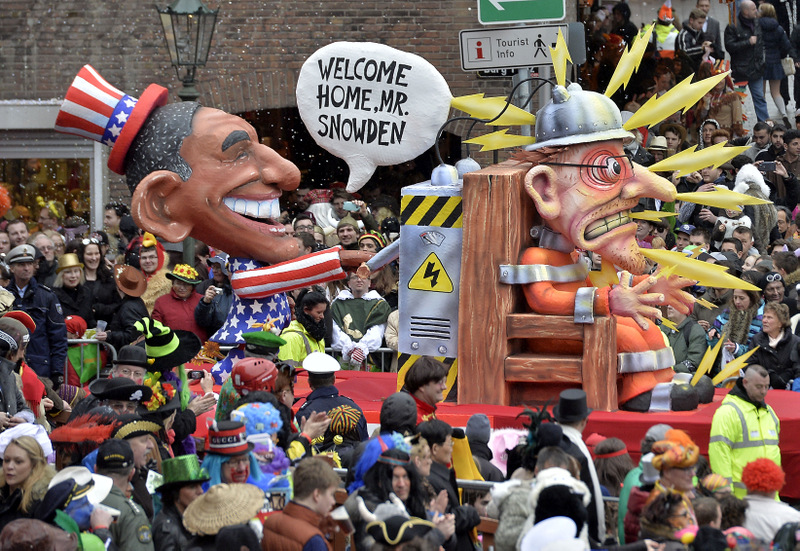
On Thursday, the Pentagon laid out for Congress the extent of the damages the intelligence community suffered due to the leaking of stolen classified intelligence documents by Edward Snowden.
In a defense budget hearing before the House Armed Services Committee, Army Gen. Martin Dempsey, the chairman of the Joint Chiefs of Staff, painted a picture showing that the cost of Snowden’s whistleblowing could reach into billions of dollars.
“The vast majority of the documents that Snowden – Mr. Snowden – exfiltrated from our highest levels of security, the vast majority had nothing to do with exposing government oversight of domestic activities,” Dempsey said in response to a question from committee member Rep. Mac Thornberry of Texas. “The vast majority of those were related to our military capabilities, operations, tactics, techniques and procedures.”
This change in the direction of detailing the impact of Snowden’s theft may represent a new strategy by the Obama administration. By quantifying the damages Snowden’s actions have caused, it would be more difficult to defend him.
While it is hard to make a perfect villain out of Snowden, it is arguable that by pointing out how long it will take to ramify the toil of Snowden’s theft and point out how all of this affected national security and individual lives, it would be easier to argue that there must be some form of reparation that must be paid.
With the deteriorating political situation in Ukraine, this argument has grown increasingly convoluted. On Sunday, Russian forces seized control of a western Crimea border guard post, trapping approximately 30 individuals inside. With this capture, Russia now controls 11 border guard posts in Crimea.
Russian complications
This is happening while a convoy of dozens of military trucks and waves of heavily armed soldiers pour into Crimea. Despite Moscow’s claims that the military buildup in Crimea is composed of separatist-minded Ukrainian forces, an Associated Press report indicated that some of the vehicles in the convoy had license plates from the Moscow region.
With pro-Russian groups having taken over the Crimean parliament and calling for a public referendum to make Crimea a part of Russia, tensions are growing. Many have came to see this act as Russian intervention after Ukraine’s pro-Russian President Viktor Yanukovych was disposed from office. Yanukovych’s removal was the culmination of Euromaidan, a series of demonstration and rallies over the course of three months to protest the Yanukovych government’s refusal to sign a trade deal with the European Union.
Russia seeks to prevent Ukraine from aligning itself with the EU. Upon news that Ukraine would sign an association agreement with the EU, Russia froze all imports coming in from Ukraine. This, coupled with the favorable terms Russia offered Ukraine in loans and aid — compared to the EU’s requirements that Ukraine address concerns over a “stark deterioration of democracy and the rule of law,” including the imprisonment of former Ukrainian Prime Minister Yulia Tymoshenko and Ukrainian opposition leader Yuriy Lutsenko — led to the Yanukovych government suspending preparations for the signing of the EU agreement. While this pleased Russia-friendly Eastern Ukraine, European-neighboring Western Ukraine grew frustrated, resulting in the protests.
A political quagmire
The situation with Crimea has devolved into a political quagmire. Most of the Western world sees Russia’s landgrab of Crimea less in regards to a call to protect ethnic Russians and more in the sense of Russian President Vladimir Putin attempting to force Ukraine into its Custom Union, an economic union of post-Soviet states that the U.S. views as a post-communist attempt to reconstruct the Soviet Union.
The West, led by the U.S., also sees this landgrab as Russia interfering with Ukraine after the nation’s recent revolution, in an attempt to warp the nation’s evolution toward pro-Russian interests.
“The United States has for some time, going back to the Bush administration and including the Obama administration, believed the international community had responsibility when there were egregious human rights violations,” said Columbia University professor Robert Legvold. “The Russians, like the Chinese, and for that matter the Indians, are deeply committed to the notion that the outside world ought not to be interfering in these domestic problems, no matter how bad they get for the populations in these areas.”
The EU is limited in its response to the situation. As most of its members are dependent on Russian gas, a Russian embargo could mean a financial recession for much of continental Europe.
With Russia’s seizing of Crimea certain to end diplomatic relations with the U.S., the likelihood of the U.S. ever bringing Snowden to justice seems increasingly remote, as long as he remains in Russia.
Many argue that retrieving Snowden should not be the primary focus right now. The bigger concern is understanding how one man managed to steal the nation’s biggest secrets without anyone knowing. Only then can the nation assure that the incident will not be repeated.
A whistleblower or a thief?
The extent of the fallout from Snowden’s disclosure is significant on both the macro and personal scales. A Feb. 10 “for official use only” memo revealed that a civilian National Security Agency employee that allowed Snowden to use his login credentials to access classified information was stripped of his security clearance and an active duty member of the military is now barred from the NSA for allegedly aiding Snowden. These security lapses could take up to two years to mitigate, Dempsey told the committee.
In November, Reuters reported that Snowden may have persuaded between 20 and 25 fellow contractors to give him their login credentials. While Snowden denied any trickery in dealing with his former co-workers at the time, the NSA did not comment on the allegation until the February memo.
Taken with head of the Defense Intelligence Agency Lt. Gen. Michael Flynn’s interview with National Public Radio Friday indicating that the U.S. has been forced to assume that Russia now has access to Snowden’s stolen documents, all of this reflects a possible change in the United States’ approach to validating its call for the extradition of Snowden back to the U.S.
Snowden is seen overwhelmingly as a whistleblower. The perception that Snowden helped to reveal a severely flawed, illegal and possibly unconstitutional multinational intelligence apparatus has defeated arguments that Snowden should be held responsible for his actions. This continuing debate on whether Snowden is a whistleblower, a traitor or both is reflected by the fact that Snowden spoke, via videoconference, at Austin’s South by Southwest (SXSW) Festival on Monday.
“Mr. Snowden’s appearance would stamp the imprimatur of your fine organization on a man who ill deserves such accolades,” Rep. Mike Pompeo of Kansas wrote to SXSW organizers in an attempt to remove Snowden from the festival schedule. “Rewarding Mr. Snowden’s behavior in this way encourages the very lawlessness he exhibited.”


